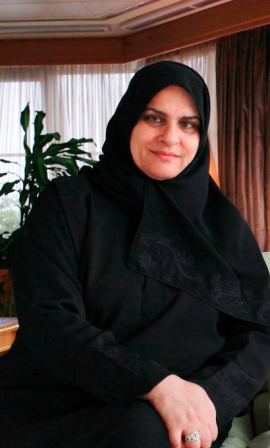Despite women’s advancement in education and workforce participation globally, there remains extreme gender imbalance on corporate boards. Recently, the UAE government moved fast and announced a declaration to make representation of women in companies’ boards, compulsory. Joyce Njeri talks to senior women in accountancy and finance to gauge their sentiments about the decree…
THIS YEAR promises to be a dramatic year for women in corporate organisations in the UAE. As the country rung in the New Year, the Prime Minister and Vice President of the UAE His Highness Sheikh Mohammed bin Rashid Al Maktoum announced a declaration to make representation of women in companies’ boards compulsory.
“Today we have made a decision to make the representation of women in all the boards of directors of companies and government entities, compulsory,” Sheikh Mohammed announced on his social networking site, Twitter.
In his pronouncement, The Prime Minister said that women had proved themselves in many workplaces and “today we want them to have a strong presence in decision-making positions in our institutions,” he stated.
A male profession
Sheikh Mohammed’s decree came barely a week after the Association of Chartered Certified Accountants (ACCA) released a studytitled; ‘Women in finance: a springboard to corporate board positions?’, which shows that proportionally, women appear more successful in attaining executive roles when they have a financial background.
While finance is often seen as a male profession, the report shows that a financial qualification or a background is seen as catalysts for women getting onto the boards of FTSE companies.
While it is too early to tell exactly how Sheikh Mohammed’s pronouncement will impact the UAE, the positive effects associated with women on corporate boards indicate the value of increased gender diversity.
A decree like the one announced by the Dubai ruler is the most viable means for increasing board diversity and ultimately adding business value to firms.
Indeed, a report by the Credit Suisse Research Institute published in 2012 shows that companies with women on their boards performed better in challenging markets than those with all-male on boards.
Quotas for women
Statistics in the research which included data from 2,360 companies, shows shares of companies with a market capitalisation of more than $10 billion and with women board members outperformed comparable businesses with all-male boards by 26 per cent worldwide over a period of 5 years [2007-2012].
The setting aside of quotas for women in corporate boards is not a new thing. In January 1, 2008, Norway enforced a gender quota requirement for corporate board membership at all public limited liability companies, where the quota requires 40% female board membership. Other countries that have also implemented quotas for the number of women on companies’ boards include Spain, Iceland, Italy, France, and Belgium.
There are other countries where quotas have also been passed and are awaiting implementation.
Globally, despite women’s advancements in workforce participation as well as in education, there remains extreme gender imbalance on corporate boards and therefore these quotas are intended to remedy the situation.
Step in the right direction
While many factors indicate that women’s participation in the workforce is strong in the Middle East, they however remain behind when it comes to corporate board membership.
According to the United Nations Statistics Division, women make up majority of university population in most of Middle Eastern countries. However, despite their high level of education, females are still under-represented in labour force.
Figures show that Qatar has the region’s second highest percentage of women in higher education at 63% of the university population, and 93% literacy among women, however, they make up just 12% of the labour force and only 7% of legislators, senior officials and managers.
Elsewhere in Lebanon, women make up 54% of university students, but only 26% of the labour force and 8% of legislators, senior officials and managers.
While these high numbers of women getting a good education is in great contrast to the statistics in the workforce, a number of women who spoke exclusively to Accountant Middle East agree that Sheikh Maktoum’s pronouncement it is a step in the right direction.
“It is a matter of pride that the UAE is among the very few nations in the world that has announced such a policy that will enhance women empowerment,” said Raja Easa Al Gurg, the President of Dubai Business Women Council.
Powerful Arab businesswomen
Raja holds membership positions in various organisations in the country. She is the Deputy Chairperson of the board of directors, Dubai Healthcare City Authority, Managing Director of the Easa Saleh Al Gurg Group, and also a board member of the Dubai Chamber of Commerce & Industry (DCCI) and the Dubai Women’s Association.
“Within the various organisations that I have been associated with, it has been a collective responsibility to encourage greater woman participation in the economic sector. Therefore His Highness’ decree offers even more strength and power to our efforts and resolutions in this sphere,” she added.
In 2006, Forbes International named Raja as the fourth most powerful Arab businesswoman, while last year she was also in the list of the ‘100 Most Powerful Arab Women’.
“While education, commitment and strong leadership has now assured women a place in the world of business as decision makers, more needs to be done from the grassroots level and beyond to make this vision of His Highness Sheikh Mohammed Bin Rashid Al Maktoum, Ruler of Dubai and UAE Vice-President a reality.”
“We live in a region where change and modernisation can only come gradually from within, but, cultural constraints could be removed through education and public enlightenment,” she observes.
Opportunities in education
According to Raja, Emirati women’s participation in the workforce continues to grow with 30% of them being active participants. It is estimated that about 29% of women have a representative role in the business with around 7% of them being owners or partners.
A report from the UAE Ministry of Economy shows that in Dubai alone, the percentage of UAE women in the workforce was at 33% in 2010. A comparison of figures from 1986 shows a growth of 236%. Similarly official figures the ministry show that half of the small-to-medium enterprise sector in the UAE is handled by women; further, 48 per cent of women business-owners are also the sole owners of their firms.
“Over the past 39 years, women in the UAE have been able to take important steps in the field of investment and entrepreneurship. They have invested in trade, banking, real estate, tourism, industrial, and contracting, construction and services sectors. They also have invested Dh2.1 billion in the manufacturing sector,” the ministry’s report states.
“We have the infrastructure and will to provide women with equal opportunities in education, starting with a learning strategy for young women, which include changes in the school system. This should be in line with the demands and priorities of a dynamic workplace and corporate environment,” Raja says.
Changing perception of women
She says that more emphasises should be on good learning techniques and skills; including the development of cognitive and communicative skills; critical thinking and leadership ability, “all of which will develop the women’s self-confidence.”
“As a nation we should all work harder on changing the perception of women and their capabilities by having topics taught in school that show how women can contribute something of value and become leaders of change.”
For Dr Nahla Al Qassimi, having a financial background increases the likelihood of a woman obtaining a board seat.
“I believe that women today can shape their destiny through knowledge enhancement or lifelong learning, active networking as well as mentoring. More women should be aware of the opportunities available to them in developing themselves. Furthermore, they should inspire change for a better future for them,” says Nahla.
Dr Nahla is an executive board member at Dubai World, aGlobal holding company that focuses on the strategic growth areas of transport, logistics, drydocks, maritime, investment and financial Services.
Hurdles to career progression
Serving on the boards of organisations can sometime be hectic, owing to characteristics such as excessive travel, working beyond contract hours, among others. While some of these facts act as an impediment to many women with the motivation and ambition to reach top-level management positions, Nahla says thatthe journey to excellence comes with a level of sacrifice.
“It is a difficult path to tread on, as women we need to balance the needs of the family with the demands of work life. But, you have to learn to create an equilibrium that keeps everyone satisfied. It is a road that every working woman travels regardless of the position she occupies in the workplace,” she says, adding, “Now it is time for Emirati women to prove themselves, demonstrating that they are capable of working professionally and effectively, be it within the workplace or the boardroom.”
“There are some social barriers but women have to reach beyond. There is a will from the country’s leadership to break down stereotypes but the change must also come from within the workforce. The fact that our nation always treated women with utmost respect, care and support, makes it easier to surmount any challenge or barrier,” Dr Nahla adds.
No preferential treatment
According to Kitty Sinaga, the Finance Manager for Food & Beverage Company MAM Foodco, Sheikh Mohammed’s pronouncement is laudable as it will encourage women’s participation at the highest level of decision-making unit.
“Personally, I am not a big fan of artificial measures to help determine the makeup of any group/organisation, as these measures could lead to abuses and preferential treatments, the very things they were trying to combat in the beginning,” she asserts.
Gender diversity has been on the corporate agenda for many years now, and yet, as one example of diversity, we still see only a small percentage of women on today’s corporate boards. Kitty observes that the reason may be due to “the size of the pool.”
“There are fewer women than men in the corporate world to begin with. There seems to be a gradual attrition, natural or otherwise, as one goes up the ladder. Perhaps it’s simply the case of anthropology: the option of staying home or going corporate is a female issue, not a male one,” she says.
Language of the boardroom
The ACCA research shows that the finance function is seen by the three groups interviewed for the research – executive search consultants, chairmen and women who have made it to the board – to be more facilitative for women’s progress to the top of corporate organisations.
Helen Brand, chief executive of ACCA says: “What we have sought to understand through this study is why the finance function is such a springboard for women. We are seeing a time of change when it comes to women’s representation in the boardroom – since the Davies Report of spring 2011, we have seen a 5% increase, equal to the entire increase over the previous decade. Our report shows that more than half of the women appointed in this period have a functional background in finance and the proportion is even higher for female executive directors, at 65%.”
The report says that finance is the language of the boardroom and having the ability to communicate financial information establishes and builds credibility.
Ironically, Kitty does not think having it would give women access to the boardroom conversation.
“It would help [having a finance qualification], although not a guarantee. I believe that it is because at the end of the day, it all comes down to figures and numbers. Also, I believe that good financial acumen gives one the ability to decipher key information and get to the meat of the issue rather quickly.”
Bottom line of businesses
Kitty has worked in various finance-related roles across industries, including hospitality, real estate, service, health care and F&B. She holds an MBA from Oxford University, UK and BS in Economics from Duke University, US.
The strongly opinionated finance profession feels that women should not be given preferential treatment when facilitating for them the path to the top of the corporation.
“Observably, the issue has progressively gained more traction and actions are being taken, to different degrees of artificiality, to facilitate gender diversity. However, corporations should not treat women any differently from how they would treat men – not any better, not any worse. Similar opportunities, similar concessions,” she quips.
It will be interesting to see how the gender quotas in the UAE will have, by most measures, make improvements to the bottom line of local organisations.
* Read Part II of this fascinating report in our March issue















